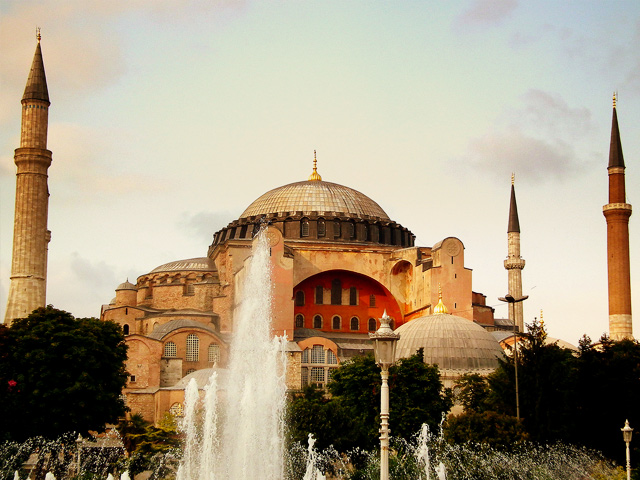Nine Essential Tips for Traveling in Turkey
TIME : 2016/2/16 15:00:18

The grand Ayasofya in Istanbul is best visited either first thing in the morning or late in the afternoon to avoid heat and crowds. Photo © Calflier001, licensed Creative Commons Attribution & ShareAlike.
As an avid—and often solo—traveler in Turkey, I’ve picked up a few handy hints from locals and through my own experiences (and mistakes):
- Turkish lira and euros are used interchangeably to price hotels and tours. Always confirm the currency quoted to avoid confusion. If the lira is low against the euro in exchange rates, asking for quotes in Turkish lira may save you some money.
- Most lodgings provide a generous complimentary Turkish breakfast of tomatoes, cucumbers, cheeses, olives, bread, and boiled eggs to guests as part of the room rates. More upmarket lodgings offer omelets, fruits, yogurt, and pastries. As a Muslim country, don’t expect bacon on the menu. When it comes to pouring the Turkish tea at the breakfast table, look like a pro and half-fill the glass with black tea and top it up with hot water; otherwise it’s too bitter.
- The water supply is not up to standard for drinking. Use bottled water, or better still, bring a water bottle. You can ask to have it refilled at the desk of your hotel.
- Mosques are free to enter and are open from the first call to prayer before sunrise until the last call to prayer after sunset. Mosques are closed to tourists for 30 minutes directly after the call to prayer, which is sung by a müezzin five times a day. This is when the imam can be heard reading verses of the Quran to worshippers. Early afternoon Friday prayers are the busiest time for mosques; expect pedestrian and road traffic to increase as people make their way to mosques. Some businesses will also close around lunchtime for less than an hour as the owner attends prayers. Prayer times are listed at www.salah.com.
- Visit the big-name attractions like the Ayasofya, Topkapı Palace, and Ephesus either first thing in the morning or late in the afternoon to avoid waiting in the hot sun and the crush of large organized tours.
- Night coaches for intercity travel are a good way to save on accommodations and time. You won’t get the solid sleep of a regular bed, but you can arrive in a new destination feeling rested. Coach companies offer complimentary tea and coffee, in-seat entertainment systems (in Turkish), sometimes Wi-Fi, comfy reclining seats, and a smooth journey. Purchase an inflatable pillow at the roadhouses for added comfort.
- Crossing chaotic roads in Turkish cities requires luck and Allah on your side. Drivers rarely stop at designated crosswalks, and giving pedestrians the right of way is almost unheard of. For your safety, use underpasses when they’re available or the controlled crossings with stop lights that bring vehicles to a halt.
- Towns with a multitude of laneways like Bodrum, Ayvalık, and Ceşme, have addresses for businesses that are laden with names and numerical details. It can get confusing and frustrating when you can’t locate your hotel or restaurant, especially on an empty stomach. Take the following fictional address, for example. “Fatih Mah. Cumhuriyet Cd. 11 Sk. N:10, Kat: 5, Ayvalık.” Navigating is easier when you know what you’re looking at. “Mah.” stands for mahallesi, “neighborhood of.” The second piece of information, “Cumhuriyet Cd.,” is the main caddesi (road) closest to the location. Sometimes streets will have numbers as their name. In this case, “11 Sk.” is the sokak (street) name, while the second number, “10,” is the number of the building. “Kat: 5” means the business is on the fifth floor.
- Not all streets are labeled, so it pays to ask the locals for directions. Do stop often and validate directions, as many won’t admit they don’t know the location but will point off to a direction anyway simply to be “helpful.”
Excerpted from the Second Edition of Moon Istanbul & the Turkish Coast.
